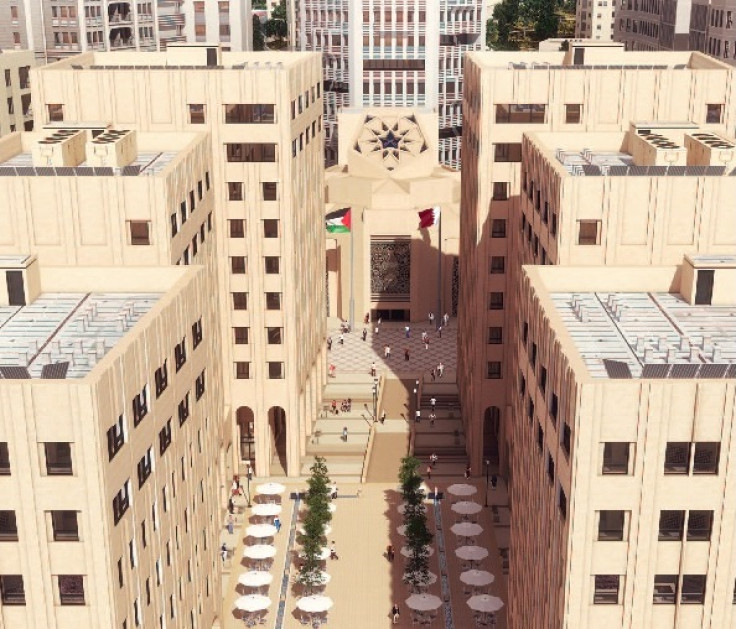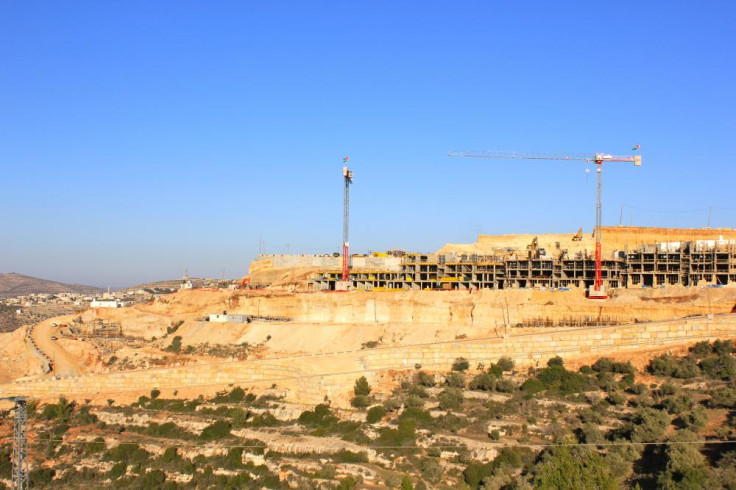Rawabi: How Palestine is Defying Gaza Chaos By Building its First Planned City

For the people of Palestine, it seems all news is bad news at the moment. The turmoil in Gaza continues to claim lives on a daily basis, and there is little prospect of breaking the impasse between Hamas and Israel - an impasse which has left thousands of people without power, water and basic sanitation.
Yet over in the West Bank a good news story is slowly, remarkably, sprouting. While hundreds of Gazan homes are being razed to the ground, in the shadow of Ramallah a new city is rising from the earth, a city which promises to underpin a sustainable, cohesive economy for the whole of Palestine and promote tolerance in a region scarred by internecine squabbling.
Welcome to Rawabi, the first planned city in Palestine.
Most people have probably never heard of the Rawabi project, but it began in 2008, when ground was broken, and it's coming along nicely despite the hugely unpleasant distraction of the Gaza conflict. When the first phase of work is complete, Rawabi will be home to 25,000 residents, and its backers are eventually hoping to house 40,000 people there. According to documents seen by IBTimes UK, demand for apartments is already high - and those expressing interest are generally young and educated, the perfect poster-children for a modern, dynamic Palestine.
The project is built on the vision of Bashar Al-Masri, an entrepreneur whose fortune is attributable to his property company, Massar International. Masri cuts a cosmopolitan figure; he left Palestine as a teenager [having participated in demonstrations against Israel] to study in Washington DC, and his two daughters still live in the US, although reports suggest the entire family will relocate to Rawabi when it is complete. To build Rawabi, Masri has entered into partnership with Qatari Diar, a firm backed by the Qatari government whose luxury portfolio includes projects in France, Italy and the US, as well as Chelsea Barracks and the Shell Centre in central London.
Right from the outset, Masri and his team has insisted on employing women – one in three of the project's engineers are female. And, although no Israeli firms are directly involved in the construction, Masri has engaged hundreds of Israeli suppliers in an attempt to build bridges, literally as well as metaphorically.
"We buy from whoever gives us the lowest price," Masri told the Times of Israel in February. "We have no choice but to cooperate with Israel and Israelis, but we also want to do so. It is a mistake to separate our economy from Israel's. Projects like this bring our peoples closer together."

Ultra-modern
Masri is building his city smack in the middle of Palestine, halfway between Jerusalem and Nablus, and a short commute from Ramallah. Key transportation links are being built to connect residents to points all over the city, while a road network will link Rawabi residents with the major population centres of Palestine. It is hoped that the road system will facilitate the flow of goods and services throughout the territory, allowing its economy to expand.
Although the development won't match the opulence of some of Qatari Diar's other investments, it will certainly be more modern and well-equipped than any other city in Palestine. Fibre optic broadband will be provided as standard, while water and liquid petroleum gas (LPG) will be conveyed by internal networks linked up to vast, remote reservoirs capable of expanding with the population. All key infrastructure connections be buried underground; according to Rawabi spokesman Jack Nassar, this is "to accommodate the future projections of the city's population, decades from now."
We want to accommodate the future projections of the city's population, decades from now
Above ground, the planners have mapped out a shopping mall, cinema, business district, hotel and convention centre, public and private schools and swathes of public space. Perhaps the most striking feature will be the Rawabi Amphitheatre, an outdoor arena with a seating capacity for 12,000 guests on carved stone seats. Cynics may suggest that Rawabi will eventually ape Dubai in its obsession with commerce and shallow attempts to manufacture history and atmosphere. However, you certainly can't accuse the planners of lacking ambition.
In a region where faith is such an incendiary topic, the developers have been careful to stress that Rawabi will not be a mono-religious enclave. Churches as well as schools will serve the young, forward-thinking population Masri and his team hope to entice. However, it seems highly unlikely there will be any synagogues; although Masri told Al Monitor "we don't discriminate between Jews, Christians or Muslims", any Israeli or foreign resident wishing to buy property in Rawabi must seek approval from the Palestinian Authority - even if they are an Arab.
Progress – but controversial progress
Since ground was broken in 2008, progress has been relatively steady. Nassar told IBTimes UK that "the first phase of the city is almost complete. Several hundred families are expected to move-in to the first and second neighbourhoods of the city early in 2015, as Rawabi's teams are putting their final additions in each home of these two neighborhoods."
The first phase of schools, mosques and churches will all be ready for the first wave of families, according to Nassar. The utilities, sewers and fibre-optic grids are in place, and the LPG network is done. The project has already generated about 5,000 construction jobs; in fact it is already the biggest private sector employer in the West Bank.
Yet controversy has never been far away from the project, largely centring on Masri's willingness to sign deals with Israeli suppliers and promote inclusivity. In 2012, Palestine's Boycott, Divestment and Sanctions committee (BDS) accused him of "advancing personal interests and profit making at the expense of Palestinian rights." Radicals on both sides continue to attack the project - and this opposition could, eventually, prove costly.
In February Dov Weisglass, the Israeli lawyer advising Rawabi in its dealings with his country's government, said that "most Israeli authorities willingly cooperate based on a deep understanding that history is being made here before our eyes, both domestically and, to a certain extent, with relation to Israel." However no-one knows whether Israel's attitude will change over time, if its relations with Gaza continue to flatline; it's easy to see the powerbrokers in Tel Aviv coming to see Rawabi as a threat. Given that Rawabi is surrounded by land under Israel's control, those powerbrokers could make life fiendishly difficult for the new city as it strives to grow.
Yet for all the concerns and caveats, one shouldn't be too cynical. Given Rawabi's physical and historical context, it is an amazing dream - one which millions of people on both sides of the Israel-Gaza debate must surely support.
© Copyright IBTimes 2024. All rights reserved.






